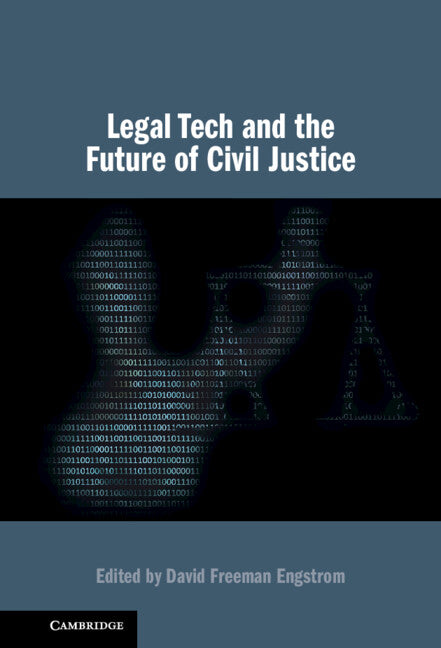Freshly Printed - allow 6 days lead
Couldn't load pickup availability
Legal Tech and the Future of Civil Justice
Provides a comprehensive, first-of-its-kind analysis of the impact of new digital technologies on the future of the civil justice system.
David Freeman Engstrom (Edited by)
9781009255356, Cambridge University Press
Hardback, published 9 February 2023
300 pages
23.5 x 15.7 x 2.8 cm, 0.73 kg
'This is an invaluable collection of scholarly and insightful essays. As civil litigation, the world over, becomes increasingly costly, time-consuming, combative, and complex, the authors show - with enthusiasm and yet realism - how technology might help both streamline and transform dispute resolution processes. Mandatory reading for litigators and judges.' Richard Susskind, Society for Computers and Law
New digital technologies, from AI-?red 'legal tech' tools to virtual proceedings, are transforming the legal system. But much of the debate surrounding legal tech has zoomed out to a nebulous future of 'robo-judges' and 'robo-lawyers.' This volume is an antidote. Zeroing in on the near- to medium-term, it provides a concrete, empirically minded synthesis of the impact of new digital technologies on litigation and access to justice. How far and fast can legal tech advance given regulatory, organizational, and technological constraints? How will new technologies affect lawyers and litigants, and how should procedural rules adapt? How can technology expand – or curtail – access to justice? And how must judicial administration change to promote healthy technological development and open courthouse doors for all? By engaging these essential questions, this volume helps to map the opportunities and the perils of a rapidly digitizing legal system – and provides grounded advice for a sensible path forward. This book is available as Open Access on Cambridge Core.
Introduction: civil justice at the crossroads David Freeman Engstrom
Part I. Legal Tech and the Innovation Ecosystem: 1. The future of American legal tech: regulation, culture, markets Benjamin H. Barton
2. Lawtech: levelling the playing field in legal services? John Armour and Mari Sako
3. Natural language processing in legal tech Julian Nyarko and Jens Frankenreiter
Part II. Legal Tech, Litigation, and the Adversarial System: 4. Remote testimonial fact-finding Renee L. Danser, D. James Greiner, Elizabeth Guo, and Erik Koltun
5. Gamesmanship in modern discovery tech Neel Guha, Peter Henderson, and Diego A. Zambrano
6. Legal tech and the litigation playing field David Freeman Engstrom and Nora Freeman Engstrom
7. Litigation outcome prediction, access to justice, and legal endogeneity Charlotte S. Alexander
8. Towards the participatory MDL: a low-tech step to promote litigant autonomy Todd Venook and Nora Freeman Engstrom
Part III. Legal Tech and Access to Justice: 9. The supply and demand of legal help on the Internet Margaret Hagan
10. Digital inequalities and access to justice: dialing into Zoom court unrepresented Victor D. Quintanilla, Kurt Hugenberg, Margaret Hagan, Amy Gonzales, Ryan Hutchings, and Nedim Yel
11. Online dispute resolution and the end of adversarial justice? Norman W. Spaulding
12. Using ODR platforms to level the playing field: improving pro se litigation through ODR design J. J. Prescott
Part IV. Courts, Data, and Civil Justice: 13. The disruption we needed: COVID-19, court technology, and access to justice Bridget M. McCormack
14. Free PACER Jonah B. Gelbach
15. Technological challenges facing the judiciary Albert H. Yoon
16. The civil justice data gap Tanina Rostain and Amy O'Hara.
Subject Areas: Computer science [UY], Impact of science & technology on society [PDR], Legal skills & practice [LAS], Law [L]


